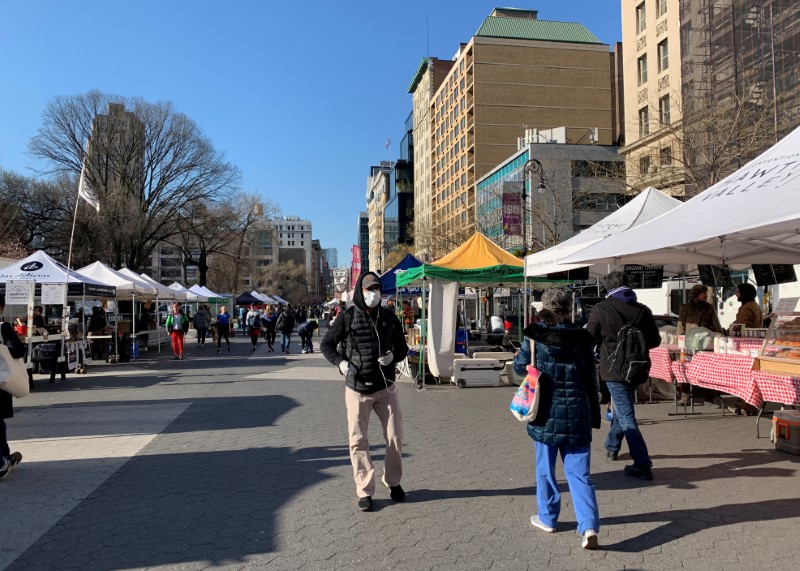By Andrew Hay and Jessica Resnick-Ault
TAOS, New Mexico/NEW YORK, (Reuters) - As people in San Francisco shelter in place and New York City was warned to prepare for a similar measure, some 40 people met in New Mexico for an Alcoholics Anonymous meeting on Wednesday amid White House pleas to avoid groups as the country battles coronavirus.
Officials are telling Americans they must practice social distancing and avoid groups of more than 10 people to slow the spread of the pandemic.
But in many places, especially outside large centers, people are defying the message. Among the reasons: The urgency has been slow to become apparent; they do not believe in the steps; or their livelihoods depend on ignoring the guidance.
Large crowds of people were still swimming and sunning themselves on Florida beaches over the weekend. Scores of people were at Walt Disney (NYSE:DIS) World Resort before it closed on Sunday, and in Rogers, Minnesota, more than 300 people attended a benefit for a county worker who received a lung transplant last year.
"We ended up dropping the food and running because I felt it was irresponsible," said Melissa Dooley, who catered the Rogers benefit on Saturday, which was held in banquet hall after the original community center venue cancelled. "We were literally in and out in 10 minutes."
In Taos, New Mexico, the Alcoholics Anonymous group met in a town park on Wednesday morning after the church building they normally use was closed. They spread out on tables underneath a covered concrete picnic area, some standing on the outside to maintain social distancing.
While they were complying with the state's ban on gatherings of 100 people or more, they were not following the White House guidance to limit groups to 10 people.
"We have to keep meeting," said one member, who asked not to be named.
As early as 10 days ago, the top U.S. infectious diseases expert, Anthony Fauci, began warning about the need to social distance and avoid crowds, then on Sunday the U.S. Centers for Disease Control and Prevention (CDC) said gatherings of 50 people or more should be cancelled for the next eight weeks.
NO WORK, NO PAY
Just a day later President Donald Trump tightened that guidance, saying people should avoid gatherings of more than 10 people to slow the spread of the virus across the country.
When asked what his message was to people who were not listening, Trump told a news conference on Tuesday: "I'm not happy with those people if they're not. But, you know, those people are being shouted down by other people ... it's almost like self-policing."
In some of the country's largest and most affected cities, like New York, Chicago and Washington, the message seemed to be getting through, with events cancelled, restaurants and shops closed and many people working from home and avoiding groups.
Elsewhere, it has been slower to take. In Las Vegas, where casinos were only shut down statewide on Tuesday, local photographer Carrie Pollard is due to photograph a wedding later this week. She said there are supposed to be fewer than 50 guests to comply with local rules and that it would be held at the couple's home instead of a hotel as originally planned.
"If I don't work, I don't get paid," Pollard, 39, said. "I'm more worried about the economy and financial stability than about the pandemic."
With coronavirus cases now reported in all U.S. states, Trump said on Wednesday he believed the message to try and stay home was getting through.
Along with avoiding gatherings of more than 10, the White House guidance also asks people to avoid discretionary travel, shopping trips and social visits.

However, Brett Lindell, a 50-year-old props stylist, said he planned to fly to San Francisco this week where he would stay at a friend's home, and he wasn't concerned about the risk of contracting the virus.
"I'm just not worried about any of it," said Lindell, as he smoked a cigarette with five friends on Wednesday outside a cafe in New York's East Village neighborhood.
"The thing that I'm most concerned about is the fact that it's separating people," Lindell said, though he added that he was trying to be respectful of people who wanted to social distance. "The fear part of it is unbelievable."